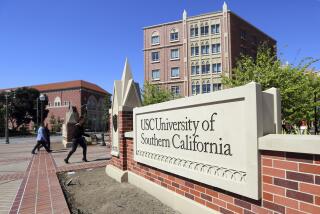UCI Fine Arts Dean Finds Plenty to Do : Robert Hickok works to cure academic ills and put his students on a professional track
- Share via
The two sides of Robert Hickok’s life are immediately apparent to a visitor to his office:
* To the left is the heavy desk behind which he sits as UCI’s third dean of the School of Fine Arts, a position he took over in December.
* To the right is a Yamaha upright piano with the score of a Scarlatti Mass perched on the music stand. He is preparing the work for a concert in November with his Irvine Camerata, a professional vocal group he founded over the summer. (See related story.)
The two worlds find common ground in the middle of the room where he sits at a circular table to give an update on his 10 months on the job.
What he has found during that period isn’t all good news. “There is hardly a corner of the school where (we) don’t need either a different kind of facility or a better one or a bigger one,” the dean says.
“We need better teaching facilities. We need better technical facilities. We need a real concert hall. . . .
“The buildings that were built here are insufficient for the purposes of a school of this kind.”
Hickok cites inadequate funding of the fine-arts school, which has yet to share in the bonanza of private funding to the university that has reached record levels this year. But mindful of university politics, he writes off the problem to the past.
“There have been undoubtedly good and sufficient reasons within the university . . . that the school has not received adequate resources in the last five or six years of its existence,” he says.
“There have been other priorities. But now it is time for the School of Fine Arts to begin to acquire the resources to support the programs that are already in place.” And, he added impatiently, “I’m not even talking about new programs at this point.”
As dean, Hickok administers a budget of $5 million for the fine-arts school.
Asked how much he needs to accomplish what he would like, Hickok laughs and plucks a number out of the air: “$10 million!”
But he’s also realistic enough not to expect the university or the state to cough up that much money.
“No professional school of fine arts can exist on any budget that any state provides, no matter how generous the state, no matter how affluent the state,” he says.
“There’s always the necessity to be out in the world, to add to your resources by soliciting contributions from individuals and corporations and foundations.”
Hickok says the school has been remiss in doing that. A full-time development director position he wanted on staff by July has yet to be added, but Hickok is optimistic that the post will be filled before the year is out.
At 62, Hickok knows his way around the academic scene. He came to UCI after three years as dean of the school of music at the University of Wisconsin, Milwaukee. For seven years before that he had been dean of the school of music at the North Carolina School of the Arts.
He also had been founding dean of the Brooklyn College School of the Arts and a faculty member of Brooklyn College of the City University of New York. He studied with composer Paul Hindemith.
Working with such renowned educators has led him to focus on what he calls “Priority No. 2”: hiring more full-time faculty at UCI.
“We have really a kind of unhealthy imbalance between part-time people who are hired on a kind of ad-hoc basis,” he says. “They’re very capable people, don’t misunderstand me, they’re very good.
“But the ratio of part-time faculty to full-time faculty, whose major commitment would be to this institution, is out of whack.”
The ratio of part-timers to tenured faculty is about 2 to 1 in the schools of music and dance; about even in studio art, and decidedly to the advantage of full-timers in drama and art history.
Hickok would only allude to the general state of the school when he took over from acting dean Bernard Gilmore, who filled in after ethnomusicologist Robert Garfias unexpectedly resigned the post in 1987. Garfias remains at the university as a professor of sociology.
“When I came in I found that there as a good deal of organizational work that I felt needed to be done,” Hickok said. “I don’t want to go any further than that.”
As to the changes he envisions, Hickok isn’t aiming solely at the faculty--he also wants to upgrade the quality of students who enter the department.
“The student body in general is quite good, quite talented. . . .
“But in the arts, particularly in the performing arts, the quality of education of ‘John’ is very much dependent upon the quality of John’s peers.
“If you have one terrific violinist in a department and the rest are completely and totally mediocre, the one terrific violin student isn’t going to get the education that he should have. . . .
“That’s particularly sensitive in music, but that’s also true in dance, also true in drama.”
Upgrading the students will be no easy task, however.
“Competition among arts education institutions for qualified students these days is absolutely fierce,” he says.
“When I was dean (at North Carolina), I spent, I suppose, 40 to 45% of my time on the road, recruiting students--with checkbook in hand for scholarships, fellowships, stipends, etc.”
He doesn’t have money to do that yet.
“We are still not, in my book, in a really competitive position,” he says.
For all that, the school has experienced substantial growth.
When UCI opened in 1965, there were 133 undergraduates in the School of Fine Arts, which occupied one floor of the Humanities Building and a 165-seat studio theater. (The school moved to its new facilities in the Fine Arts Village complex in 1970.)
Last year, enrollment hit 803 students, 100 of whom were graduates.
Hickok insists that the school is putting these students on a professional track.
“The major thrust of this school from its inception, and the philosophical basis of the school now, stamps it as a professional school; that is to say, one that is training its students to go out into the world to make livings as artists, as performers, as creators,” he says.
“The other point of view . . . is to give (students) information about music, let them take a few piano lessons and then they go out and make their livings doing something else. But they’ll have this nice, rich cultural background.
“That’s fine. I have no argument with that. But that is not the mission of this school.”
And to Hickok, the school is preparing students for a tough mission.
“You can’t find more difficult professions to make your way in than acting, singing, playing the violin or drawing,” he says.
To help UCI meet its responsibility to prepare students, he is exploring whether “our curriculum is in fact geared to provide our students with the kind of professional education that will enable them to go out and compete for the few jobs that are out there.
“Any number of university schools of music and even conservatories in this country will take a young violinist and teach him how to play the Mendelssohn Violin Concerto, the Tchaikovsky Concerto, etc. They give him his degree, pat him on the back and say, ‘Good luck.’
“The only problem with that is that nobody is out there waiting to hear him play the Mendelssohn concerto, etc. Orchestra managers want to know, ‘Can you play the first fiddle part to all the Brahms symphonies?’ Well, if you can’t, you’re going to have a problem.”
But how does he hope to achieve such conservatory-style training in an academic setting?
“I see UCI in a kind of interesting position. This is a university that is very hard to get into. The standards here are very high. And one of our recruitment problems is the fact that many students who have spent a good part of their time practicing the fiddle or whatever, learning how to dance on pointe, have not established academic records that make them automatically eligible for entrance here.
“I think that UCI needs to adjust its recruitment and admissions policies in regard to that so that we’re sure that we’re really getting the talented kids who also have the intellectual ability to do the other requirements at this institution.”
He believes that those students can have the best of both worlds.
“I think a student coming here has a marvelous opportunity to get a great, general education and a wonderful professional education. The whole idea of instructing and maintaining that balance is the trick.”
More to Read
The biggest entertainment stories
Get our big stories about Hollywood, film, television, music, arts, culture and more right in your inbox as soon as they publish.
You may occasionally receive promotional content from the Los Angeles Times.










